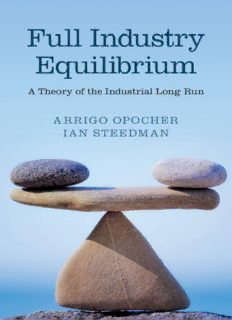
Full Industry Equilibrium: A Theory of the Industrial Long Run PDF
Preview Full Industry Equilibrium: A Theory of the Industrial Long Run
Full Industry Equilibrium This highly original book develops a systematic zero-net-profit compar- ative statics theory of the firm that challenges many widely held views in microeconomics. It builds a bridge between the marginalist long-run theoryofthefirmandSraffiantheorytocreateaunifiedtheoreticalframe- workthatexplainshowfirmsreacttoexogenousshocksresultinginnew equilibrium positions of the whole economy. The central message of the book is that too often economists expect more from the microeconomic laws of input demand and output supply than they can really give. The authors show that the zero-net-profit condition requires a more articu- lated analysis that sometimes yields qualitative results contrary to those offamiliareconomiclaws.Writtenforacademicresearchersandgraduate students, the book will be of particular interest to those working on the microeconomicsofindustryequilibrium,comparativestaticsandSraffian economics. arrigo opocher is Full Professor of Economics at the University of Padua. He has published in leading economics journals on the topics of economictheoryanditshistoryandhaswrittenbooksonlong-rungrowth andtradetheory.Heisco-editorofthejournalMetroeconomica. ian steedman is Emeritus Professor of Economics at Manchester MetropolitanUniversity.Heisthe(co-)authororeditorof14booksand over140articles.Untilhisretirementhewasveryactiveineditorialwork for the Cambridge Journal of Economics, the European Journal of the HistoryofEconomicThoughtandMetroeconomica. Full Industry Equilibrium A Theory of the Industrial Long Run arrigo opocher and ian steedman UniversityPrintingHouse,CambridgeCB28BS,UnitedKingdom CambridgeUniversityPressispartoftheUniversityofCambridge. ItfurtherstheUniversity’smissionbydisseminatingknowledgeinthepursuitof education,learningandresearchatthehighestinternationallevelsofexcellence. www.cambridge.org Informationonthistitle:www.cambridge.org/9781107097797 (cid:2)C ArrigoOpocherandIanSteedman2015 Thispublicationisincopyright.Subjecttostatutoryexception andtotheprovisionsofrelevantcollectivelicensingagreements, noreproductionofanypartmaytakeplacewithoutthewritten permissionofCambridgeUniversityPress. Firstpublished2015 AcataloguerecordforthispublicationisavailablefromtheBritishLibrary ISBN978-1-107-09779-7Hardback CambridgeUniversityPresshasnoresponsibilityforthepersistenceoraccuracy ofURLsforexternalorthird-partyinternetwebsitesreferredtointhispublication, anddoesnotguaranteethatanycontentonsuchwebsitesis,orwillremain, accurateorappropriate. To Antonella and Xiaoling Contents Listoffigures page xi Listoftables xiii Preface xv Introduction 1 Anoutlineofthebook 4 1 Takingseriouslythetendencytozeronetprofits 8 1.1 Thelong-runtheoryofthefirm,theindustryand theeconomy 10 1.2 Thelong-periodtheoryofproduction,theindustryand thefirm 13 1.3 Fullindustryequilibrium 17 1.4 Comparingfullindustryequilibria 19 1.5 Concludingremarks 21 2 Anisolatedindustry 22 2.1 Fullindustryequilibrium 23 2.2 Anexample 26 2.3 ThecomparativestaticsofFIE 30 2.4 Ontherelationshipbetweeninputuseandinputprice 33 2.5 Onasupposedrelationshipbetweenlong-runoutput andprice 35 2.6 Producedinputuse.Averysimplecase 35 2.7 Afallingrealpriceofcomputingpower.Theroleof complementarity 39 2.8 Beyondtwice-differentiableaveragecostfunctions. On/offinputs 40 2.9 Concludingremarks 43 Appendix1 OnHicksiansubstitution 43 A1.1 InputsubstitutioninValueandCapitalandbeyond 43 A1.2 Hicksiansubstitutionandon/offinputs 47 vii viii Contents Appendix2 Asmallopeneconomy 49 A2.1 ThestandardHOSmodelasanexampleofFIE 49 A2.2 Tradeandindustry-specificfactors 52 A2.3 TheHOSmodelwithintermediateproducts 54 A2.4 Conclusion 57 3∗ Multiproductfirms 58 3.1 FIEwithmanyoutputsandoneinput 59 3.2 ThecomparativestaticsofFIE 65 3.3 FIEwithmanyoutputsandmanyinputs 68 3.4 ThecomparativestaticsofFIE.Thegeneralcase 69 3.5 Alternativeconceptsofsubstitution.Ageneralformulation 74 3.6 Concludingremarks 76 4 Interdependentindustries 78 4.1 TheFIEinputpriceswithinterdependentindustries: anintroduction 79 4.2 TheFIEinputpricefrontier 81 4.3 ThecomparativestaticsofFIE 83 4.4 Anexample 86 4.5∗ Moregeneral 87 4.6 Introducingapositiverateofinterest 89 4.7 Aone-industryeconomyonceagain 90 4.8 Twoindustries 91 4.9∗ ManyindustrieswithCEScostfunctions 94 4.10 Concludingremarks 97 5 Industry-levelinputuse.Someaftershocksfrom capitaltheory 100 5.1 Labourandcapitalperunitofoutputinaparticular industry 101 5.2 Thedirectuseofprimaryinputsinaparticularindustry; previousliterature 104 5.3 AWickselliantwo-periodcase 105 5.4 ANuti-modelcase 110 5.5 Thecorn-tractor(Samuelson–Surrogate)case 112 5.6 Aninput–outputcase 115 5.7 Recurrenceofthecompleteinput–outputmatrix 116 5.8 Concludingremarks 118
Description: